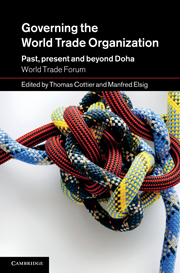Book contents
- Frontmatter
- Contents
- List of figures
- List of tables
- Notes on Contributors
- Preface
- List of abbreviations
- 1 Introduction
- PART I Setting the stage
- PART II Boundaries
- PART III Emerging and established powers
- 6 Adapting to new power balances: institutional reform in the WTO
- 7 Delegation chains, agenda control and political mobilisation: how the EU Commission tries to affect domestic mobilisation on the DDA
- PART IV Weaker actors
- PART V The consensus principle
- PART VI Quo vadis?
- Index
- References
6 - Adapting to new power balances: institutional reform in the WTO
Published online by Cambridge University Press: 07 September 2011
- Frontmatter
- Contents
- List of figures
- List of tables
- Notes on Contributors
- Preface
- List of abbreviations
- 1 Introduction
- PART I Setting the stage
- PART II Boundaries
- PART III Emerging and established powers
- 6 Adapting to new power balances: institutional reform in the WTO
- 7 Delegation chains, agenda control and political mobilisation: how the EU Commission tries to affect domestic mobilisation on the DDA
- PART IV Weaker actors
- PART V The consensus principle
- PART VI Quo vadis?
- Index
- References
Summary
Introduction
Debates on institutional reform of the WTO are not new, nor is a growing attention to the rise of new powers – particularly Brazil, China and India (the BICs) – and their implications for international trade. What has received less attention is the link between the changing balances of power, the responsiveness that the WTO has already shown to the rise of new powers, and the very poor results that this responsiveness has generated. Despite having been given a seat at the High Table of the Doha negotiations, the BICs show only limited signs of leadership. Despite having retained their position in the new Quad (see next section), the EU and the US remain disengaged. And despite its general trend of improving transparency and inclusiveness, the WTO has failed to inspire loyalty from its smaller and weaker Members. Recurrent deadlock in the Doha negotiations is one symptom of this institutional failure; another is the proliferation of alternatives that take the shape of regional and bilateral trade agreements.
In this chapter, following this introduction, I provide a brief account in the first section of the timely institutional adaptation of the WTO to changing external imperatives, including the evolving balance of power. In the second section, I investigate why this has not resulted in the smoother functioning of the organisation.
- Type
- Chapter
- Information
- Governing the World Trade OrganizationPast, Present and Beyond Doha, pp. 111 - 128Publisher: Cambridge University PressPrint publication year: 2011
References
- 5
- Cited by



